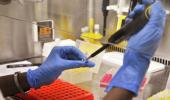As India reports a high number of Omicron BA.2 cases, a top health expert has said it is not a cause of concern because it will not lead to another COVID-19 surge in the country.

Speaking to ANI, co-chairman of National IMA COVID Task Force, Dr Rajeev Jayadevan, said that BA.2 is a sub-lineage of Omicron variant, which fuelled the third wave in the country. According to him, BA.2 cannot infect those who have previously had BA.1 sub-variant of COVID-19.
"It will not cause another surge. BA.2 is not capable of infecting people who had BA.1. It's not a new virus or strain. BA.2 is a sub-lineage of Omicron," Dr Jayadevan said.
The health expert further said that BA.2 will be more transmissible than BA.1 and it has mutated to increase its transmissibility.
"BA.2 is a little bit more transmissible than BA.1. For the last two years, it has constantly evolved to increase its fitness, which is its ability to infect more people and to leap past natural immunity and vaccinated immunity," he said.
Dr Jayadevan also said that the Omicron variant showed that vaccine immunity can be 'easily surpassed by variants' and this trend will continue to be seen in future, if new variants emerge after mutation of the virus.
"Omicron showed that even vaccine immunity can be easily surpassed by variants and this trend will be expected in the future as new variants arrive. But BA.1 and BA.2 both have immune escape ability which means that if you've been naturally infected, or if you've been vaccinated or both, this virus can still infect us," he noted.
Explaining the nature of BA.2, Dr Jayadevan said, "It is the sub-lineage of Omicron and is essentially as same as Omicron that was identified in November in South Africa. It now has BA.1, BA.2 and BA.3."
He also said that virus will be around for a very long time time.
"Virus is going to be around. It will come in ups and downs for a very long time. When the next variant comes, there will be a surge. We do not know when that will be, but history says that it can happen once inevitably six to eight months and that is typically how it acts."
"But until then, we are now in the low phase Omicron. However, what we should remember is this virus is around which means that we must do everything we can to stop it from infecting us," he added.
Citing a study conducted on hamsters in Japan, Dr Jayadevan said that BA.2 may cause severe lung disease.
"As of today, symptoms of Omicron are no different between BA.1 and BA.2. So there is no difference in severity. However, there is a study from Japan done on hamsters. In this study, hamsters showed that BA.2 involved the lungs more than BA.1."
On the trend of the Omicron BA.2 cases globally, he said, "It is believed that BA.2 is increasing in India. But in several other Asian countries in the region and across Europe, the prevalence is slowly increasing, particularly in Denmark. There's a slight increase in the United States and also in Britain."










